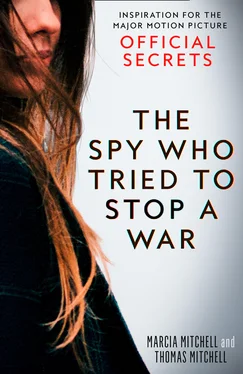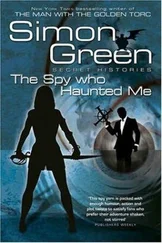‘We were all aware that Hans Blix and the WMD inspectors had not yet had a chance to complete their work. From the beginning it had been estimated that it would take them at least six months once in place to provide any kind of realistic assessment. They had been there about three months when Koza’s message arrived. This was troubling, I would guess, for a lot of us.’
Yasar worked on Saturdays. For Katharine, this Saturday was a day of moving about in something of a fog, the real world obscured behind a hazy scrim, where the words of the NSA memo were all that seemed clear, spelling out what would happen if she were to reveal its contents.
‘At no point during the weekend did I consider telling any of my family members, or even Yasar, because I didn’t want to jeopardize anyone else. I wanted everyone else to be wholly innocent of the affair. But also, at the back of my mind, I was thinking that if I did it, I would do it anonymously. And, hopefully, no one would ever know it was me. We regularly see in the press leaks from official sources, and there never seems to be any kind of retribution, anybody being arrested or charged for making those leaks.’
The question that tortured her throughout the weekend was this: Will I get away with it? She felt confident that she would, that she could remain anonymous. Later, she realized that she didn’t know how to play the game, didn’t know the unwritten rules.
‘I knew there are people, especially those who work in London in both the civil service and the intelligence service, who brief journalists very much below the radar, sort of unofficially, without jeopardizing their positions. And they get away with it. You read about the leak, oh, not one of this nature, but you never hear about who was responsible or a manhunt under way to find the source. No one is punished. No one is identified. This is what I hoped for. This is what I expected.’
Looking back, Katharine recognizes the problem. The ‘official unofficial’ briefings – call them ‘controlled leaks’ – are for the most part institutionalized. A selected journalist, one from each major news entity and each category of news within that entity, communicates directly with his or her assigned contact within an intelligence service. There are unwritten ground rules. The intelligence contact is never named and the information provided is reported to have come from ‘known reliable’ or ‘unnamed government’ sources. The arrangement is mutually beneficial; journalists get information for their stories, and the government releases certain information it wishes to get to the public without having it attributed to a specific individual. Amateurs like Katharine are not allowed to play the game.
There was a caution that kept returning, a fear that had to be placed into the emotional conflict of indecision. Or, perhaps a decision made but not yet wholly accepted. It was the critical matter of Yasar’s safety.
They were wildly in love, these two, the blonde, petite Englishwoman and her ‘beautiful, beloved’ husband. Just six months earlier, Katharine had married the man of her dreams, the tall, dark Mediterranean charmer with finely chiselled features and a quick, expansive smile. They met at the café where he worked, where she would go for coffee in the evenings after leaving GCHQ. He would wink from across the counter, and she was enchanted. ‘He was the most beautiful man I’d ever seen,’ she says.
The café, small, unpretentious, was a comfortable, intimate place, ideal for chatting after work, when the chat had to be about anything but work. Filled with light, the café was perfect for people from GCHQ, whose days were spent in a darkness that had nothing to do with either natural or artificial illumination.
Most evenings, Katharine was accompanied to the café by a male GCHQ colleague. Yasar, eyeing pretty Katharine seated with her companion, assumed she was ‘taken’, which was not true. The man with her was a friend, not a boyfriend. Since Yasar made no advance other than a wink now and then, Katharine assumed he was not interested. This, too, was not true. Finally, unaccompanied to the café, Katharine winked back. He came to stand beside her.
‘I’m going to the cinema,’ she said, and then, surprising them both, ‘what are you doing later?’ He had a break, he told her. Would she like to go for a walk? Yes, she would very much like that; she had time for a walk before the picture started. From that moment on, Katharine Harwood had no space in her life for any other man. Winking led to frequent evening walks, which eventually led to dating. They were married in an intimate ceremony attended by a small group of friends and her parents, newly arrived from Taiwan. The family met the enigmatic young man for the first time the night before the wedding.
‘I felt better after meeting him,’ Katharine’s father, Paul Harwood, says. ‘He obviously adores her.’
Weeks after they first started dating, Katharine discovered that Yasar, still learning English, often communicated with customers in the café by winking. It was a way of greeting people. ‘He winked at everyone,’ she laughs.
There was little to laugh about when, two weeks after the marriage ceremony, Yasar was picked up by immigration authorities and taken into police custody, where he was held incommunicado until the following morning. Rushed to Heathrow airport, he was prepared for deportation to Turkey. In their home with her family now up in the north of England, Katharine was on her own and near panic. The fear that she would never see her husband again was suffocating.
Katharine made an urgent call to a solicitor, begging, ‘Please help us.’ They were legally married, she explained. She was a UK citizen! How could this happen? With help, the mess was untangled, government officials called officers at the airport, and the bridegroom was released just moments before the plane bound for Turkey left the gate. A devastatingly close call.
Yasar’s visa, extended, was still temporary. He had asked for asylum, given unsettled political issues in Turkey. They were awaiting an answer. Finally, eventually, Katharine put her money – and Yasar’s safety – on anonymity. It was an egregiously unfortunate wager.
By the afternoon Katharine had decided to make one call, to tell one person about the Koza message. (She has guarded that person’s identity throughout the whole affair.)
‘I called the person that I ultimately sent the e-mail to. I haven’t named her in public and I won’t. Let’s just call her Jane. She was the only person I talked to about this, and I could trust her. I knew how she felt about the war, about the impending invasion of Iraq. We both felt pretty much the same way about the whole issue. I also knew that she had been in contact with a member of the media who probably would help. I didn’t know anybody else whom I could trust and who had a contact like that. So I called Jane to tell her what I’d seen. I didn’t go into details; I just said that I’d received an e-mail I thought was damaging enough that, if it were leaked, might have the effect of preventing the war – or at least delaying it until other options had been exhausted. I asked her if I could send it to her, or perhaps she suggested that I could send it to her.’
On Sunday morning, Katharine and Yasar had a ‘lie-in’, then a big Turkish breakfast of olives, cheese from his home country, tomatoes, cucumbers, lots of toast, and a big pot of tea. Together they cleared away the breakfast things, chatted easily, read the voluminous Sunday newspaper. Later they took a ride out into the countryside, stopping at a picturesque little village for afternoon tea. It was all so deceptively normal.
As usual, Yasar fell asleep to soothing music, drifting off long before his wife on Sunday evening. This night, it would take Katharine an uncharacteristically long time to fall asleep, music or no. She was remembering the GCHQ staff memo of one week ago.
Читать дальше












